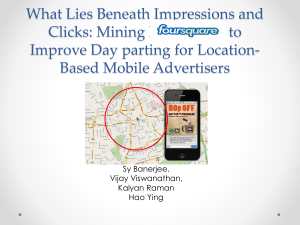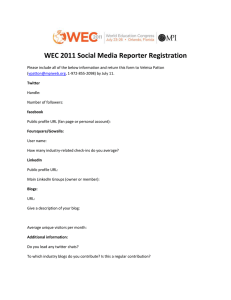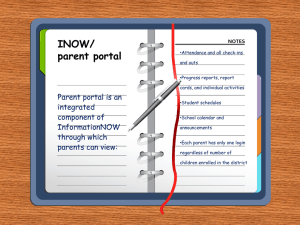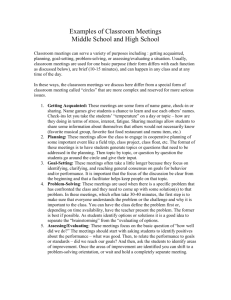Understanding Bias and Misbehavior on Location-based Social Networks “Will Check-in for Badges”
advertisement
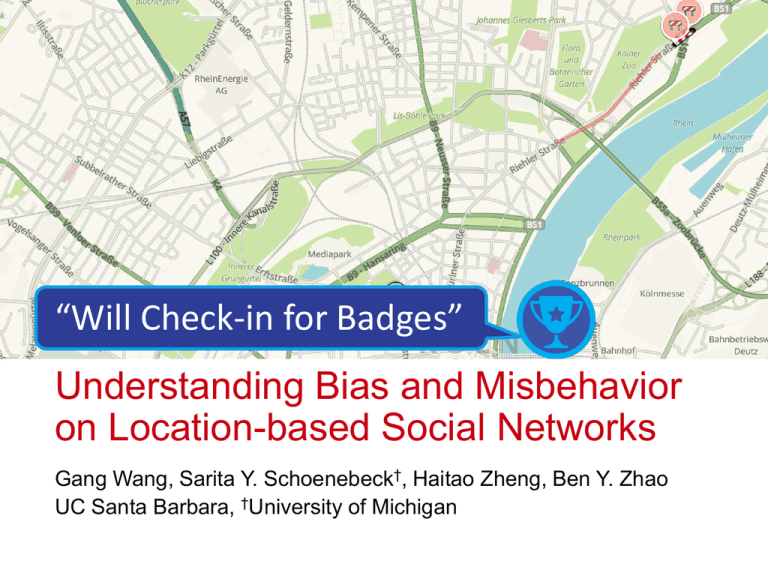
“Will Check-in for Badges” Understanding Bias and Misbehavior on Location-based Social Networks Gang Wang, Sarita Y. Schoenebeck†, Haitao Zheng, Ben Y. Zhao UC Santa Barbara, †University of Michigan Chipotle on Foursquare 1 Chipotle reported its first quarterly loss this year • 29% decline in sale Foursquare predicted this accurately (30% of loss) Significantly less check-ins and user visits! 2 Understanding Human Mobility Traffic Planning Disease Control Mobility data wanted Infrastructure Deployment • large-scale • detailed Disaster Response Picking Business Locations • accurate Check-in Data to the Rescue • Location-based social networks (LBSN) – “Check-in” to locations, share with friends – Foursquare: 55 million users, 7 billion check-ins, 65 million venues as of 2015 • Increasingly available check-in data – Large scale, public, crawl-able • Researchers use data for: Inferring friendships; Predicting human movement; Urban planning; Content delivery network design 3 Is This the Answer? • Concerns: data representativeness – Are check-ins a small sample of real mobility? – Are there biases in location check-ins? • Our initial effort: match check-ins with GPS traces – 244 Foursquare users, data of two weeks [HotNets’13] Our data collection app Check-in trace: a list of 4square check-ins GPS trace: a list of visit events Temporal / Spatial Matching 4 Check-ins vs. Real Mobility 14,297 Check-ins Extraneous 10772 30,835 GPS visits Honest 3525 Missing 27310 Significant mismatch between Check-in and real mobility! 75% Check-ins are extraneous (“cheating”) 89% location visits have no check-ins 5 This Study Focuses on “Why” • User intent behind biased check-ins – Why do users miss check-ins? – Why certain check-ins don’t match physical visit (extraneous)? • Revisit conclusions of initial work – Representativeness of check-in data – New methodology: user study • Implications: check-in data for human mobility study 6 Outline • Introduction • Methodology: User Study • Result: Motivations of Biased Check-ins • Implications 7 User Study Methodology • Survey Foursquare users – Do users have extraneous/missing check-ins? – What’s the user intent behind biased check-ins? • “Primary”: data from our earlier study – Users who voluntarily installed our app, check-in/GPS Self-selection Bias: would the app attract particular types of users? What’s the impact to conclusion? • “Turker”: users recruited from Mechanical Turk – Broader set of users to validate conclusion 8 Primary vs. Turkers • Examine self-selection bias 23 Primary Users (out of 244 invited) Check-ins** 108 Turker Users (Amazon Mturk) 1770.8 (2521.2) 603.5 (91) Badges** 37.7 (29.2) 13.8 (16.8) Mayors** 14.3 (26.9) 0.2 (0.4) Friends* 45.4 (58.0) 23.1 (39.7) Foursquare Profile Attribute: Mean (STD) ** * The measurement app isp<0.05, likely P < 0.1 Compare survey answers attract more “active” users from both user groups 9 10 Do You Make Extraneous Check-ins? Check-ins that do not show up in GPS traces • Remote: check-in location >500m away • Extra: checking-in to many nearby locations 30%-40% • Driveby: check-in while moving at high users speedclaim to have performed check-ins “How“cheating” often do your friends making Fraction of Users Never Sometimes Often Always extraneous check-ins?” 100% Extraneous check-ins prevalent on Foursquare 80% 60% 40% 20% 0% More users claim they observe their friends cheat Remote Extra Driveby [Turkers] Extra Driveby Remote [Turkers Friends] [Primary] Why Extraneous Check-ins 11 Agreed Turkers Agreed Primary “To get extra points to get a badge” 30% 22% “To get coupons, discounts or free stuff” 29% 13% “To become the Mayor of those places” 22% 26% “To appear cool or interesting” 20% 9% “To win a competition among my friends” 16% 13% “To impress my friends with my check-ins” Top 3 incentives related to 15% 0% 4square reward mechanisms “To make new friends around those places” 10% 4% 4Square rewards are trace primary incentives, can we remove them? • Matched well with analysis (Pearson Correlation) – Rate of rewards, remote check-ins vs. claim # of Badges: 0.49 use 4Square less • Our study: w/o 50% users they would – Rate of extra check-ins vs. #badges of Mayorships: • Anecdotal evidence: 4Sq removed in 2014,0.34 brought back in 2015 Where Don’t You Check-in? • Top 3 places: home, work, school Fraction of Users 1 0.8 0.6 0.4 0.2 0 • • Check-ins are only a biased sample of real movement Disproportionally downsampling certain types of locations 12 Cause for Missing Check-ins Agreed Turkers Agreed Primary “This place is not interesting” 59% 34% “I have privacy concerns” 56% 39% “Forgot to check-in” 47% 30% 13 Users ignore boring and private places 36% 4.3% New 4Square app (Swarm) “Concerned about stalked” 33% tracking 0.0% being Passive GPS location But data is no longer “Avoid too many notifications to friends” 32% public 17.3% “Avoid unwanted encounters” “Avoid being judged negatively” 23% 8.7% 14 Summary • Check-ins do not represent real mobility – Extraneous: falsified location data – Missing: uneven downsample of real movements • Both types of biases are likely to persist – Removing reward mechanism discourages user engagement – Pervasive location tracking has privacy issues (non-public) Questionable usage of Check-in Represent real-world user population or density Build user mobility models Promising usage of Check-in Social/cultural aspects in LBSN Venue recommendation Ad placement 15 Thank You! Questions?
